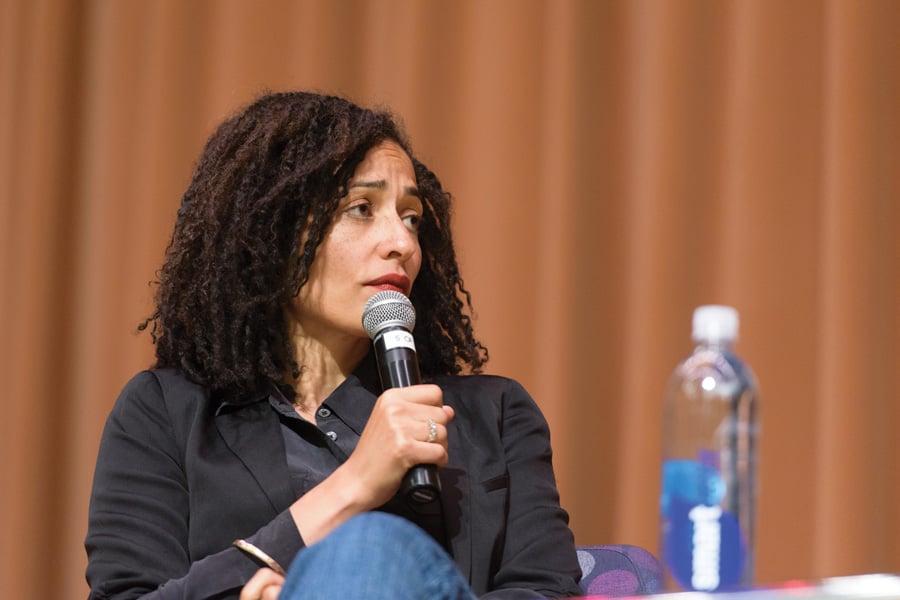Author Zadie Smith discusses race, identity expressed in her work
Kate Salvidio/The Daily Northwestern
Author Zadie Smith, best known for her novel “White Teeth,” speaks at Ryan Auditorium in the Technological Institute. Smith discussed race and identity, and how it is reflected in her work.
May 12, 2017
Author Zadie Smith said she grew up searching for black actors on TV because there were so few. Though they mostly played a small range of characters such as maids, she said she loved seeing them doing the best they could with their art.
Smith discussed race, identity and her literary work during an event Thursday hosted by Contemporary Thought Speaker Series. Smith, who is well known for her novel “White Teeth,” which explores Britain’s relationship with people from formerly colonized countries, spoke at Ryan Auditorium in Technological Institute in front of more than 150 people.
Weinberg junior Ben Zimmermann, co-chair of CTTS, told The Daily he appreciates how Smith talked about important current topics through her writing.
“She’s really the exact type of speaker we’re trying to bring because she’s pushing us to think about really important topics from race to politics to growing up in everyday life in interesting and new ways,” Zimmermann told The Daily.
As a black and female writer, Smith said she is a minority in Britain’s literary scene, which is dominated by white men. She said she uses writing as her form of art to express herself and reflect on her racial identity.
Smith said she is excited to work in the United States as a black woman because she found “more space” as a writer compared to when she was in the United Kingdom. If it were not for her Cambridge background, which gave her access to the British literary world, Smith said “White Teeth” might not have been so widely circulated.
She said she hopes for change in Britain for greater representation.
“To black, British women, part of me wants to say get out of Britain,” Smith said. “It’s painful for black, British women who wonder when their time will come. From a black, British person’s perspective, it feels exciting (in the United States).”
For those aspiring to become writers, Smith advised them to read more “vertically” — exploring more historical and traditional work. Smith, who also teaches English at New York University, said her students are experts of contemporary literature but often neglect writings from the past. It is an advantage to be knowledgeable about classic literature and writing, as most current work is a reflection of the past, she said.
During a Q&A session on Thursday, Smith was asked why her race and identity dominated the evening’s discussion. As a black and female writer, Smith said, her work is an expression of herself.
Medill senior and former Daily columnist Carson Brown, who attended the event, said she admires how Smith uses her writing to express history and life. Brown also said she agrees with Smith about how one’s identity cannot be separated from their work.
“I, as a black woman, cannot separate myself from my art,” Brown told The Daily. “We live in a world where blackness and womanness is important, and it is seen and it is something that you will be identified by, no matter what you do and what you try to do, and it does influence your art. But it doesn’t make it more or less, it just is.”
Email: catherinekim2020@u.northwestern.edu
Twitter:@ck_525



